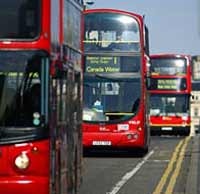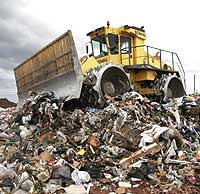
A wide body of evidence points to the importance of appealing to 'intrinsic' values of community, equality and the environment. Photograph: Marko Djurica/REUTERS
A
report published by McKinsey this month found that nearly a quarter of UK households say they are 'somewhat' or 'heavily' burdened in paying off unsecured debt.
Given Britons' appetite for buying stuff, CSR managers, environmental campaigners and progressive politicians alike can be forgiven for thinking that we can at best hope to turn consumerist urges into 'greener' consumerist urges. As the former chief of Tesco
Sir Terry Leahy once said: "In the early part of this century we must now achieve a new revolution in green consumption... The green movement must become a mass movement in green consumption." Of course, this is a perspective that also chimes with business need.
A wide body of evidence points to the importance of appealing to 'intrinsic' values – of community, equality and the environment for example – rather than engaging people through appeal to 'extrinsic' values, such as 'wealth', 'power' and 'social recognition', which are associated with higher levels of materialism. Appeals to intrinsic values lead to greater concern about social and environmental issues, and higher motivation to act in line with this concern.
That's all well and good. But what if a person is already oriented towards holding extrinsic values to be particularly important? Maybe it's simply not possible to engage them otherwise?
We, along with Alex Nolan, at the
School of Psychology at Cardiff University, examined the values of more than 700 adults living in the Cardiff area. We then invited those who fell into the top 10% for the importance that they placed on extrinsic values to participate in a study.
Half of these participants were asked to spend a few minutes thinking about why intrinsic values – for example, 'being broadminded' – were important to them. The other half were asked to reflect on why they felt extrinsic values – for example, 'wealth' or 'preserving my public image' – were important to them. We then interviewed these people about a range of concerns: climate change, loss of the British countryside, domestic child poverty, and child mortality in developing countries.
The interviews were recorded and transcripts were sent to Paul Chilton, a discourse analyst at the
Department of Linguistics and English Language, Lancaster University. He scored the transcripts 'blind' to whether the participants in the interviews had been asked to reflect on intrinsic or extrinsic values.
Chilton found significant differences between how these two groups of people talk about these issues.
So, for example, consider how one participant spoke about climate change. This was someone who, like all participants in this study, tended to place high importance on extrinsic values. In this case, the participant was also asked to reflect on the importance of some extrinsic values, before being interviewed about climate change.
Reflecting on energy-saving
behaviour, the participant said: "Mm, what would motivate me? I suppose money if there was a financial incentive to be more proactive...I do tend to switch things off but that's more a case of me saving money in electricity than thinking oh that's gonna help the world."
This is the type of response that is often reported from focus-group interviews. It leads to the conclusion that the most effective way to encourage environmental concern among large parts of the British population is to urge these behaviours in terms of saving money or boosting a person's image.
But look what happened after the researchers asked another participant (someone who also considered extrinsic values to be particularly important) to reflect on the importance that they attached to intrinsic values. Simply thinking for a few minutes about the importance of 'being broadminded' or of 'affiliation' to friends and family led to very different ways of talking about climate change.
This participant said: "I do think that the earth and the environment is precious and valuable … I think it should be at the top of the political agenda… I think that the world that we pass on to the next generation, you know, is our responsibility."
Whether developing new national narratives around climate change and why citizens should be concerned about this, or creating an advertising campaign for a 'green' product, we should be alive to the likely benefits of appealing to intrinsic values.
What I found interesting about this piece is that it actually thinks realistically about many people's motives for saving energy and trying to live in a more eco friendly manner, although the idea of intrinsic values is very important in this piece as well as the idea of saving money and creating a better public image for yourself.




























